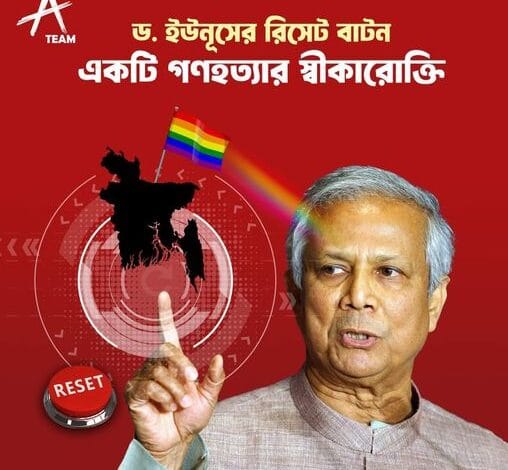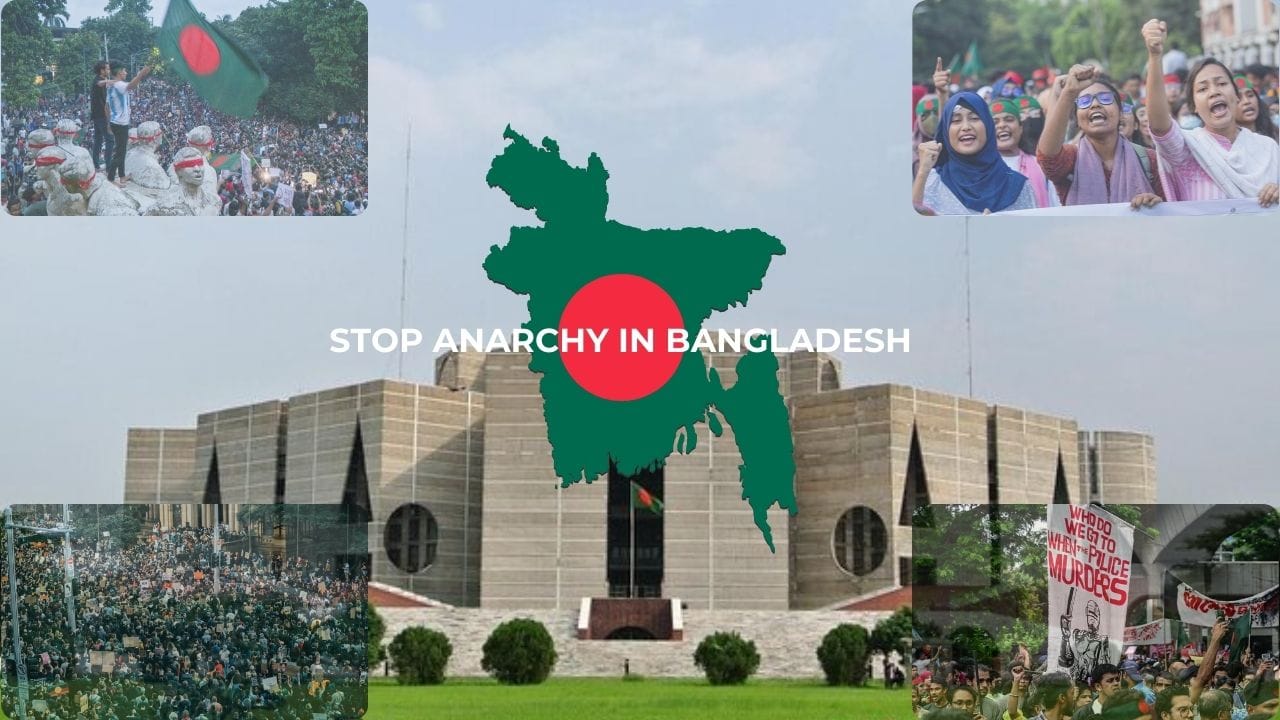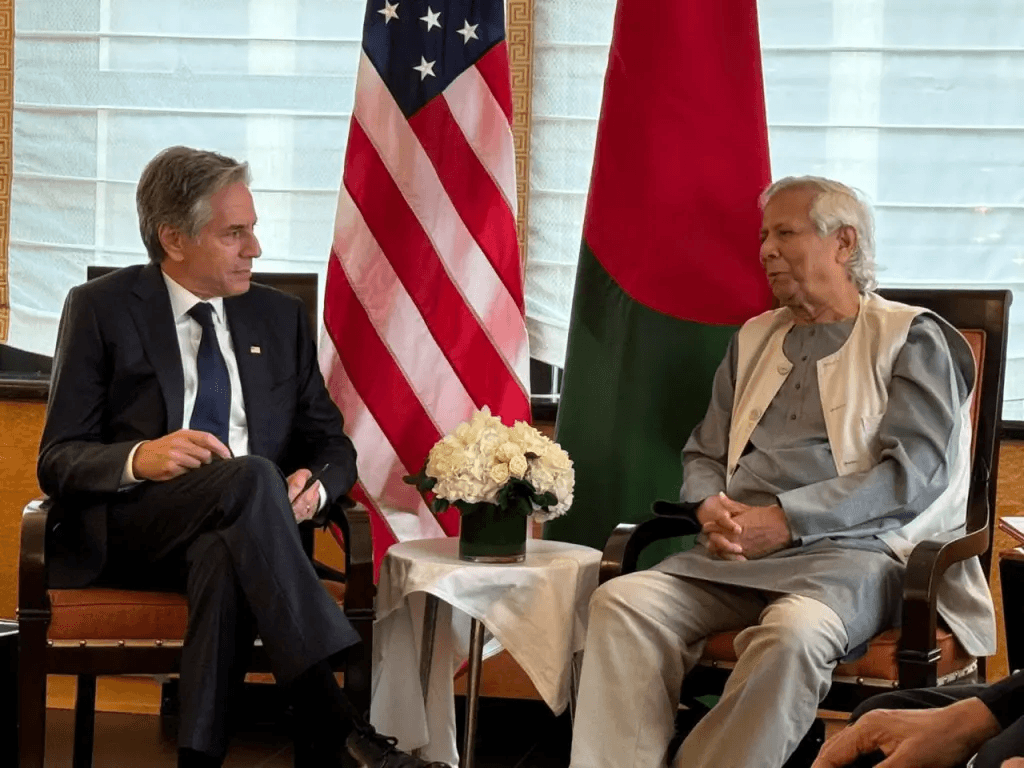Dr. Yunus’s “Reset Button” and a Nation on the Brink: Bangladesh’s Struggles Amidst Political Turmoil
Nobel laureate Dr. Muhammad Yunus, a global icon in his pioneering work with microfinance, is once again at the forefront of controversy within Bangladesh. The phrase “reset button” has recently

Nobel laureate Dr. Muhammad Yunus, a global icon in his pioneering work with microfinance, is once again at the forefront of controversy within Bangladesh. The phrase “reset button” has recently cropped up in political discourse, rumoured to have been taken from a message from Yunus, signalling a need for a complete overhaul of the country’s political and social framework. In this language, one hears voices of despair for a regime change, which they allegedly might lead to riots. Along with all these tensions, dark undercurrents hint at a deeper confession of national trauma–a “confession of a genocide”.
Bangladesh is reeling from unprecedented turmoil in a country that has long been an arena of extreme polarisation in the political environment. Renewed clashes and confrontation have erupted once again between the ruling Awami League and opposition parties, namely the Bangladesh Nationalist Party (BNP), levelling accusations of human rights abuses, mismanagement of the economy, and corruption in the political sphere and boardrooms.
Dr Yunus and the “Reset Button”
At the heart of the current storm is Dr. Yunus whose criticisms of the government have sharpened in the last few months. The term “reset button,” which Yunus supposedly used in his talks with political and civil society leaders, has become a rallying term for the change many in Bangladesh had longed for. Yunus, who had built a name himself in his efforts to uplift the poor through micro loans, has grown increasingly framed in recent times as the voice of the disillusioned by the current system of politics.
For the Yunus supporters, the “reset button” will represent a peaceful return to democracy; free and fair elections with no corruption, rule of law, and restoration. Yunus is seen as a reformer, ready to challenge the status quo for the greater good of Bangladesh.
For the ruling Awami League, though, the same phrase has much darker tones. The government has seen Yunus’s call as a plot to destabilise the nation because demands for such radical changes could quickly result in violent uprisings. High-ranking officials have even accused Yunus of conspiring with opposition figures as if his rhetoric is building toward some sort of political meltdown.
Political and Social Unrest
Bangladesh has been a land of political instability for decades, but in modern times the situation is much more charged than at any other time in recent memory. The Awami League, led by Prime Minister Sheikh Hasina, has held sway over politics since over a decade ago, presiding over a great economic development boom. Economic development, however, has in many’s view come increasingly at the expense of democratic freedoms and authoritarianism.
The opposition BNP, which is the party of former Prime Minister Khaleda Zia, has been attributed to the current government votes of supporting electoral riggings and repression of dissent. Protests against the government had gained strength several months ago, and reports about crackdowns on protesters and opposition leaders are coming from all over the country. These gave further powder to fuel the allegations of rampant corruption within the ruling party and misuse of state resources, as well as a disregard for democratic norms.
In this light, the phrase “reset button” acquires even more symbolism for the hopes of those disenfranchised by the political climate of the moment.
Confession of a Genocide
Amid all this political bedlam, a darker narrative is taking shape. The word “a confession of a genocide” has been invoked in the talk of the state’s alleged complicity in such a violation of human rights. The exact context for that phrase is unclear, but human rights groups are reading it to be something akin to a confession of those systemic abuses and killings Bangladesh has overseen, especially against its political opponents and minorities.
For Bangladesh, the most important and painful chapter of history, however, continues to be 1971, the Liberation War, when possibly as many as 300,000 to 3 million people perished fighting for independence from Pakistan. Yet, the word “genocide” is being applied to describe the atrocities of more recent incidents-punitive and extra-judicial killings, disappearances, and violent crackdowns on opposition forces.
International watchdogs, like Human Rights Watch and Amnesty International, have, at one time or another, accused the Bangladeshi government of a knee-jerk reaction in politics. Torture, police brutality, and arbitrary arrests are everyday complaints with accusations hurled at state forces, particularly Rapid Action Battalion, for taking the law into their own hands. The confession of genocide is the acknowledgment of a growing concern with abuses that could be indicative of state actors committing atrocities.
The Road Ahead For Bangladesh
As Bangladesh inches toward another election cycle, the stakes have never been higher. Growing unrest together with the rhetoric around Yunus’s “reset button” and the grim undertones of a “genocide,” Bangladesh is on tenterhooks. Both sides of the political divide prepare for what many fear might be decisive and violent confrontation:.
Bangladesh’s future is now in limbo. Will the movements called for by Yunus result in a peaceful political transition or will the country continue its downfall into greater chaos by the government tightening its noose on power? The coming months will be a crucial period to know if Bangladesh manages to come out of its murky present to become a more democratic and just society or will it continue to drown in chaos and human rights abuses.
Conclusion
Dr. Yunus’s entry into Bangladesh’s political discussion, especially his plea for a “reset button,” triggered a fervent debate on the country’s future. While the country struggles with political turmoil and complaints of human rights violations, there is a looming threat of genocide confession against the government. It is too early to predict whether Bangladesh can get out of the bind and take steps towards peaceful resolution, but at least for the time being, the nation’s fate is dangling by a knife’s edge.



